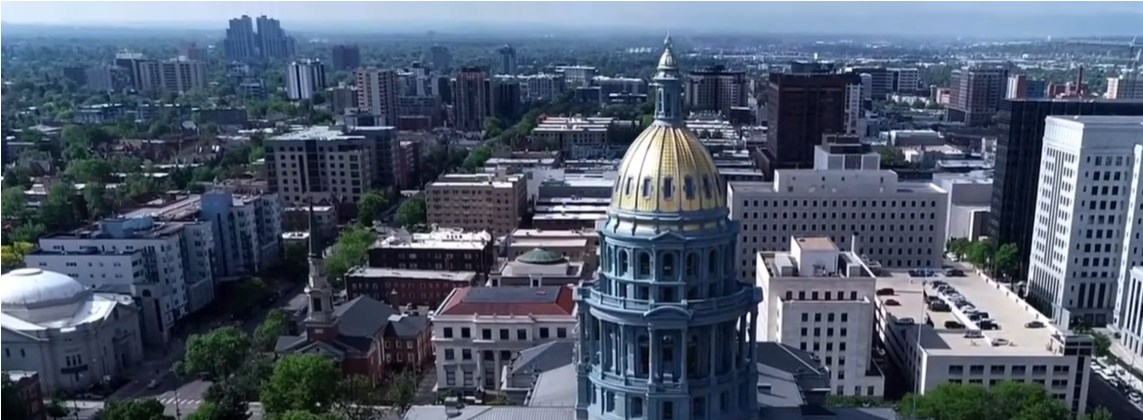Denver, Colorado, is a vibrant and rapidly growing city that is home to over 700,000 residents. It is the capital of Colorado and one of the most populous cities in the state. The city’s history is rooted in the mining boom of the mid-19th century and has since evolved into a center for business, culture, and outdoor recreation. But when was Denver founded, and what is the story behind its development?
The origins of Denver can be traced back to the Pike’s Peak Gold Rush of 1858-1859. The discovery of gold in the region attracted thousands of people from across the country, and many settled in the area now known as Denver. Initially called “Auraria,” after the gold mining town in Georgia, the settlement was founded in November 1858. The following year, a group of prospectors founded another settlement on the other side of Cherry Creek, which they called “Denver City,” after Kansas Territorial Governor James W. Denver.
The two settlements competed with each other for a time, but eventually merged in 1860 to form “Denver,” with a population of around 4,700 people. The new city quickly became the center of business and trade in the region, thanks in part to its location along the South Platte River and the arrival of the transcontinental railroad in 1870. The city’s population continued to grow, and by 1890, it had surpassed 100,000 residents.
Denver’s early growth was fueled by mining, agriculture, and transportation. The city was an important hub for transporting goods and people across the western United States, and it became a center for manufacturing, banking, and other industries. The construction of the Denver and Rio Grande Railroad in the 1870s and 1880s further accelerated the city’s growth, allowing for faster and more efficient transportation of goods and people.
Denver’s growth slowed in the early 20th century, as the city faced several challenges. The collapse of the silver mining industry in the 1890s, coupled with a national economic recession, led to a decline in population and economic activity. The city also struggled with political corruption and social unrest, particularly in the form of labor strikes and protests.
Despite these challenges, Denver continued to grow and develop. The city hosted the 1908 Democratic National Convention, which helped to put it on the national map. In the decades that followed, Denver experienced significant growth in its economy, infrastructure, and cultural institutions. The city became home to several major universities, including the University of Denver and the Colorado School of Mines, and it also established itself as a center for the arts and entertainment.
In recent years, Denver has continued to experience rapid growth and development. The city has become a hub for technology startups, and it has attracted large companies like Amazon and Google. It is also a popular destination for outdoor enthusiasts, with easy access to the Rocky Mountains and several major ski resorts. As a result, the city’s population has surpassed 700,000, making it one of the fastest-growing cities in the United States.
Today, Denver is a diverse and dynamic city with a rich history and a promising future. Its founding in the mid-19th century was driven by the search for gold, but its growth and development have been shaped by a variety of factors, including transportation, industry, politics, and culture. The city’s residents take pride in its history and heritage, and they continue to work to ensure that Denver remains a vibrant and thriving city for generations to come.
Denver’s history is marked by a number of important milestones and events. In 1904, the city’s first municipal airport was established, which later became Denver International Airport, one of the largest airports in the world. In 1922, the city hosted the Democratic National Convention, which was attended by future president Franklin D. Roosevelt. During World War II, Denver played a key role in the war effort, serving as a major center for the production of military aircraft and other equipment.
The city has also had its share of challenges and struggles. In the 1960s and 1970s, Denver experienced significant racial tensions and civil unrest, particularly in the form of protests against police brutality and discrimination. The city’s African American community was disproportionately affected by these issues, leading to calls for greater social and economic justice.
In recent years, Denver has worked to address some of these issues and to promote greater equity and inclusivity. The city has implemented a number of initiatives aimed at reducing poverty, improving education, and increasing access to affordable housing. It has also taken steps to address climate change, including the adoption of a comprehensive sustainability plan.
Despite these efforts, Denver faces a number of ongoing challenges. The city’s rapid growth has led to concerns about gentrification and displacement, particularly in historically marginalized communities. Traffic congestion and transportation issues are also a major concern, as the city struggles to keep pace with its growing population.
To address these issues, Denver has implemented a number of policies and programs aimed at promoting sustainable growth and development. The city has invested in public transportation, including the expansion of light rail and bus rapid transit systems. It has also adopted a comprehensive land use plan, which seeks to balance growth with the preservation of open spaces and historic neighborhoods.
Overall, the history of Denver is a story of resilience, innovation, and growth. From its early days as a mining town to its current status as a thriving metropolis, Denver has always been a city on the move. As it continues to evolve and change, Denver will undoubtedly face new challenges and opportunities, but its residents remain committed to building a brighter and more sustainable future for themselves and for future generations.

